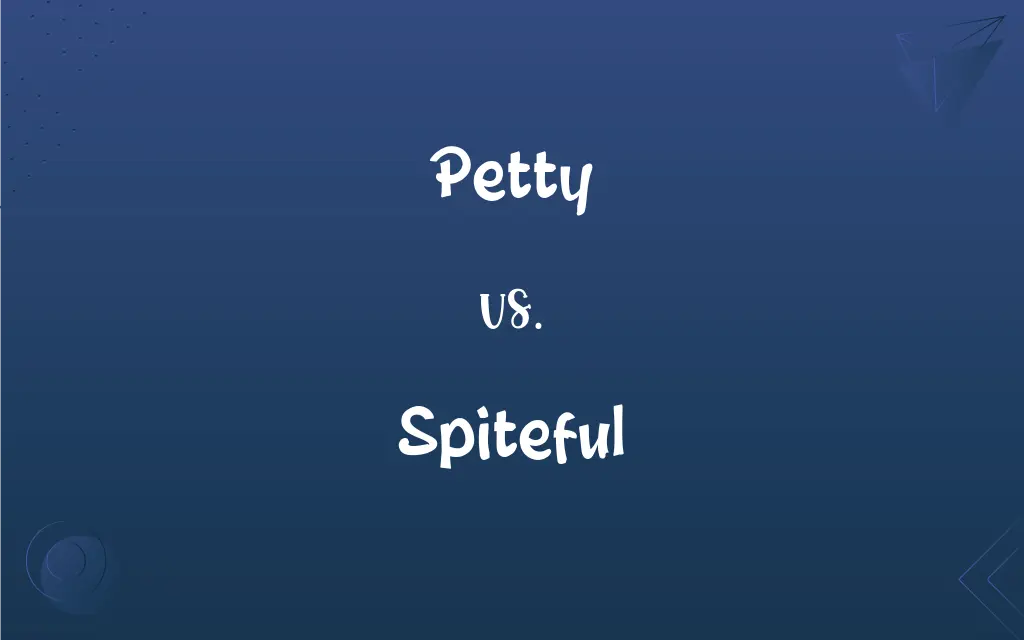Petty vs. Spiteful: What's the Difference?
Edited by Harlon Moss || By Janet White || Updated on October 18, 2023
"Petty involves small-mindedness or trivial matters; Spiteful means acting with intentional malice or ill-will."

Key Differences
Petty is a term that describes actions, attitudes, or concerns that are of little importance, often highlighting a person's narrow-mindedness or trivial complaints. In contrast, Spiteful specifically refers to behavior that's driven by a desire to hurt, annoy, or offend someone, emphasizing malice rather than triviality.
Being Petty can often relate to an inability to let go of minor grievances or to engage in small, inconsequential actions that don't necessarily stem from a desire to cause harm but rather from pettiness or minor annoyance. However, being Spiteful is inherently linked to ill-intent, where actions are taken with the primary aim of inflicting pain or discomfort upon another, irrespective of the significance of the underlying issue.
Petty behavior might not always be grounded in malevolence but could stem from one's limitations, insecurities, or immaturity, leading to an overemphasis on unimportant matters. Spiteful behavior, on the other hand, is grounded in malevolence, with the perpetrator's satisfaction coming specifically from knowing the other party is suffering or disadvantaged in some way.
The consequences of Petty actions are generally less severe, potentially leading to annoyances or minor disruptions, given the trivial nature of the matters involved. In contrast, Spiteful actions, due to their malicious intent, can have more serious, far-reaching consequences, potentially causing lasting harm or enmity.
Petty is often used in the context of disputes or disagreements where the subject matter is of little real significance, potentially making a situation seem more frivolous than it needs to be. Spiteful, however, elevates the scenario to one of intentional harm, where the gravity lies not in the issue itself, but in the malevolent intent behind the actions taken.
ADVERTISEMENT
Comparison Chart
Definition
Small-mindedness
Intentional malice
Intent
Lacks malice
Driven by malice
Consequences
Usually minor
Potentially severe
Root Cause
Insecurity, immaturity
Ill-will, vindictiveness
Context of Use
Trivial matters
Acts to cause harm
ADVERTISEMENT
Petty and Spiteful Definitions
Petty
Petty implies narrow-mindedness or small-mindedness.
His petty behavior during the negotiation revealed his lack of professionalism.
Spiteful
Spiteful means showing a desire to harm or upset someone.
The spiteful rumor was spread to tarnish her reputation.
Petty
Petty refers to placing undue importance on trivial matters.
Her petty complaints about the event seemed to focus only on insignificant details.
Spiteful
Spiteful indicates malicious behavior or attitude.
His spiteful comments during the meeting created unnecessary tension.
Petty
Petty also means of minor importance or low rank.
He was caught up in petty criminal activities before realizing the need for a change.
Spiteful
Spiteful suggests an intent to retaliate or get revenge.
She made a spiteful gesture, canceling the contract to get back at her partner.
Petty
Petty can describe a lack of generosity or tolerance.
She had a petty attitude, unwilling to share credit with her colleagues.
Spiteful
Spiteful refers to actions taken out of pettiness or meanness.
The spiteful prank caused more distress than amusement.
Petty
Of small importance; trivial
A petty grievance.
Spiteful
Spiteful can describe someone as being filled with or showing spite.
His spiteful nature made it difficult for him to maintain lasting friendships.
Petty
Showing an excessive concern with unimportant matters or minor details, especially in a narrow-minded way
Petty partisanship.
Spiteful
Filled with, prompted by, or showing spite; malicious.
Petty
Of lesser importance or rank; subordinate
A petty prince.
Spiteful
Filled with, or showing, spite; having a desire to annoy or harm.
Petty
(Law) Variant of petit.
Spiteful
Filled with, or showing, spite; having a desire to vex, annoy, or injure; malignant; malicious; as, a spiteful person or act.
Petty
Having little or no importance.
A petty fault
Petty squabbles
Spiteful
Showing malicious ill will and a desire to hurt; motivated by spite;
A despiteful fiend
A truly spiteful child
A vindictive man will look for occasions for resentment
Petty
Of persons or their behaviour: marked by or reflective of undesirably limited interests, sympathies, or views; begrudging, selfish, small-minded; also, preoccupied with subjects having little or no importance and not mindful of broader concerns.
Such literature may well be anathema to those who are too docile and petty for their own good.
That corporation is only slightly pettier than they are greedy, and they are overdue to reap the consequences.
Petty
(historical) Of or relating to the lowest grade or level of school; junior, primary.
Petty
Little or small in size.
Petty
Secondary in importance or rank; minor, subordinate.
Petty cash
Petty officer
Petty
An outbuilding used as a lavatory; an outhouse, a privy.
Petty
(historical) A class or school for young schoolboys.
Petty
A little schoolboy, either in grade or size.
Petty
Little; trifling; inconsiderable; also, inferior; subordinate; as, a petty fault; a petty prince.
Like a petty godI walked about, admired of all.
Petty
Inferior in rank or status;
The junior faculty
A lowly corporal
Petty officialdom
A subordinate functionary
Petty
(informal terms) small and of little importance;
A fiddling sum of money
A footling gesture
Our worries are lilliputian compared with those of countries that are at war
A little (or small) matter
Mickey Mouse regulations
A dispute over niggling details
Limited to petty enterprises
Piffling efforts
Giving a police officer a free meal may be against the law, but it seems to be a picayune infraction
Petty
Contemptibly narrow in outlook;
Petty little comments
Disgusted with their small-minded pettiness
Petty
Petty means being concerned with things of little significance.
The manager's petty rules about office decor frustrated the staff.
FAQs
What does Petty mean?
Petty refers to giving undue importance to trivial matters or concerns, often indicating a small-minded or trivial approach.
What does it mean to be Spiteful?
Being Spiteful means acting with the intent to hurt, annoy, or offend someone, often out of malice or vindictiveness.
Can Spiteful actions be justified?
Spiteful actions, due to their malicious intent, are generally viewed negatively and are rarely justified in healthy relationships or interactions.
Are Petty people always vindictive?
Not necessarily; Petty individuals might focus on trivialities more than necessary but aren't always motivated by vindictiveness.
Is being Petty a personality trait?
Pettiness can be a temporary behavior in response to certain situations or a more ingrained personality trait.
How does one deal with Spiteful individuals?
Dealing with Spiteful individuals may require setting firm boundaries, avoiding retaliation, and seeking mediation or support if necessary.
How can one stop being Petty?
Overcoming Pettiness can involve self-reflection, prioritizing issues, developing empathy, and learning to let go of trivial matters.
Is Spiteful behavior a sign of immaturity?
Spiteful behavior can indicate immaturity, insecurity, or unresolved emotional issues, as it's rooted in a desire to cause harm.
Can Petty disputes be harmful?
While Petty disputes are typically over minor issues, they can escalate or contribute to a toxic environment if not addressed.
Why do people engage in Petty arguments?
Individuals might engage in Petty arguments due to stress, a need for control, personal insecurities, or attention-seeking behavior.
Can Petty behavior affect relationships?
Yes, Petty behavior can cause unnecessary strain and conflict in relationships, often over inconsequential matters.
Can companies have Petty policies?
Yes, companies can sometimes implement Petty policies that are overly detailed or unnecessarily restrictive on minor issues.
Are Spiteful individuals aware of their behavior?
Some Spiteful individuals are consciously malicious, while others may be unaware of the full impact of their actions.
Is there a psychological explanation for Spiteful behavior?
Spiteful behavior can be linked to various psychological factors, including low self-esteem, past traumas, or personality disorders.
Can Spiteful actions stem from jealousy?
Absolutely, Spiteful actions can often originate from feelings of jealousy, leading individuals to act maliciously toward those they envy.
How is Spiteful behavior viewed in society?
Spiteful behavior is generally frowned upon in society as it's associated with malice and a desire to cause harm to others.
Can being Petty affect one's career?
Being Petty can negatively impact one's career, as it may lead to conflicts, hinder teamwork, and portray a lack of professionalism.
What's the impact of Spiteful words?
Spiteful words can harm the emotional well-being of others, strain relationships, and contribute to a hostile environment.
Is Spiteful behavior a form of bullying?
Yes, Spiteful behavior can be a form of bullying when it involves repeated, intentional actions to hurt, intimidate, or demean others.
Is Pettiness a sign of insecurity?
Often, yes; Pettiness can be a manifestation of one's insecurities, where minor issues are blown out of proportion to deflect from personal shortcomings.
About Author
Written by
Janet WhiteJanet White has been an esteemed writer and blogger for Difference Wiki. Holding a Master's degree in Science and Medical Journalism from the prestigious Boston University, she has consistently demonstrated her expertise and passion for her field. When she's not immersed in her work, Janet relishes her time exercising, delving into a good book, and cherishing moments with friends and family.
Edited by
Harlon MossHarlon is a seasoned quality moderator and accomplished content writer for Difference Wiki. An alumnus of the prestigious University of California, he earned his degree in Computer Science. Leveraging his academic background, Harlon brings a meticulous and informed perspective to his work, ensuring content accuracy and excellence.































































